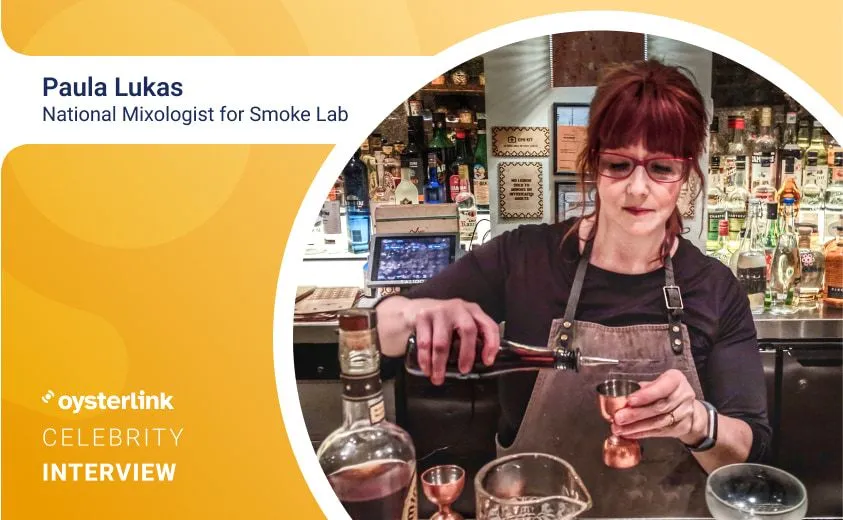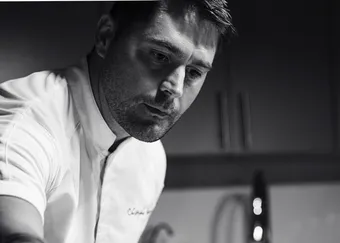We had the pleasure of sitting down with Paula Lukas, a true icon in New York City's bartending scene. In our interview, we dug into Paula's remarkable career journey, exploring what kept her motivated and the steps aspiring bartenders can take to mimic her success.
Paula generously shared her insights, noting the benefits of today's bar landscape, where bartenders can gain exposure through competitions and social media. She also highlighted the modern-day challenges facing those pursuing a bartending career. Join us as we uncover the secrets to a thriving career in bartending.
What inspired you to become a bartender and how did you develop your craft and technique?
Paula: When I first started bartending, it wasn't exactly a career choice; it was more of a way to earn some extra cash. I began as a server like most people my age, but then I noticed how much fun the bartenders were having, so I jumped in when asked to fill in. That's how it all started. It's vastly different now from when I first began. In some ways, it's better, but not necessarily in every aspect.
I got to interact with people and get paid for it. This was before the whole craft cocktail scene took off, and bartending became so creatively focused. I've dabbled in corporate work, sales, real estate – you name it. But sitting at a desk all day just isn't for me. I had a background in professional theater, but the business side of it didn't appeal to me. Bartending, though, felt like a perfect fit.
I'm very social, so chatting with people over drinks while getting paid was right up my alley. Plus, when you build rapport with customers, the tips can be amazing.
And let's face it, I'm not a morning person, so the night shifts suited me better. I've always preferred the in-between hours, and bartending tends to offer that flexibility.
Things have changed a lot in the industry since I first started – now there are cocktail competitions, articles promoting bartenders, and a newfound respect for the craft. Back then, people often questioned whether bartending was a "real job," which was frustrating.
Then, about twenty years ago, when cocktails started gaining traction, I was asked to create a cocktail menu for a place I was managing and bartending at. It was a thrilling challenge, tapping into my artistic background to craft unique drinks.
Can you share some recommendations or tips for those interested in bartending on how to get started and secure a bartending job or career?
Paula: For those looking to pursue a bartending career, you should focus on doing your job well rather than treating it as just a side gig. It is completely fine if it's just a way to get some extra cash but treat it the way you would treat your dream career. Keep learning and taking classes – there's always more to learn in any industry. Be honest about the job experience during interviews. Learn to read your customers and make recommendations based on their preferences. Familiarize yourself with the menu and drinks, even if you don't personally enjoy them. Remember to acknowledge customers, even when busy, and avoid ignoring them – it's a pet peeve of mine as both a bartender and a customer.
“When it comes to hiring managers, they should hire individuals who genuinely fit the role, not just bodies to fill shifts. “
Poor management can impact business, so prioritize creating a positive work environment.
How does one know if bartending is the right career path for them?
Paula: Deciding whether bartending is the right career path involves considering your personal preferences, work environment expectations, and future goals. Sometimes, it's not the job itself that doesn't resonate but rather the specific workplace culture or lack of desired fulfillment. I've experienced places where I dreaded going to work and others where I loved it.
During interviews, it's crucial to be honest about your experience. It's always better to openly admit you're still learning and eager to grow than to pretend you have all the answers.
While bartending schools can provide valuable foundational knowledge, real learning happens through hands-on experience. Be open to guidance and embrace opportunities to learn from seasoned professionals, even if their techniques differ from what you've encountered before.
Be honest on your resume, as any dishonesty will eventually get discovered. Lastly, be open to new techniques, even if they're different from what you're used to. “Adaptability is crucial for success in this industry.”
If you could give one piece of advice to someone aspiring to become a successful bartender, what would it be?
Paula: This business is all about hospitality. Sure, you can whip up a fantastic drink, but what keeps customers returning? It's not just about the drink; it's about the staff. You build relationships with regulars and engage with them.
Back when I started bartending, cell phones weren't a thing. Nowadays, it's like people would rather scroll through their phones than have a conversation. Why would I want to return to a bar where nobody talks, whether alone or with friends?
It's becoming a trend, especially among the younger crowd. They don't want to make the extra effort to connect. That's part of why I left my last job – the team wasn't willing to work. Management plays a crucial role. If you don't have good leadership, the whole team suffers. That's a general rule for any business.
Hiring has become a challenge, especially post-COVID. I recently guest edited at Chilled Magazine, and my platform was all about bringing back genuine hospitality.
Customers want to feel welcomed, not just served. It's about the experience, not just the drink or the food.
What are the benefits of bartending?
Paula: The benefits of bartending are as diverse as the drinks we serve. Firstly, there's the flexibility – few other professions offer the opportunity to work varied hours and adapt to different schedules. Then, there's the creative freedom; crafting cocktails is like being an artist behind the bar, allowing you to express yourself and experiment with flavors.
Socializing is another huge perk; you're constantly meeting new people, forging connections, and creating memorable experiences for patrons. Bartending offers a unique career path where you can climb the ranks, from bartender to head mixologist or bar manager, with each step bringing new challenges and opportunities for growth. And let's not forget about the tips – when you build rapport with customers and deliver exceptional service, those tips can be downright amazing, making all your hard work and dedication worthwhile.
So, if you're looking for a career that combines flexibility, creativity, socializing, and growth potential, bartending might be the perfect fit.
How do you handle challenging situations, such as dealing with difficult customers or managing a crowded bar during peak hours?
Paula: Handling challenging situations and demanding customers requires a mix of assertiveness and empathy. Sometimes, you have to involve a manager to prevent things from escalating.
I've had my fair share of encounters with intoxicated or underage people trying to skirt the rules, especially in places without strict ID checks. Some insist they're hotel guests or claim they've been served elsewhere without ID, but sticking to the policy is non-negotiable. Dealing with confrontational individuals can be difficult. But it's essential to stand your ground while remaining respectful.
surprising is that about 99% of the time, when you assert yourself firmly but politely, these customers back down. It's a reminder that most people respond well to kindness and clear boundaries.
And both bartenders and managers must support each other in these situations. After all, while the customer isn't always right, handling disagreements with professionalism can turn a challenging moment into a positive experience.
What's the one game-changing tip or insight you wish you knew when you started bartending in the city?
Paula: Oh, this is a piece of advice you might not have seen coming, though it might seem obvious: wear comfortable shoes! Trust me, it's been a lifesaver. Now, when it comes to how to do the job itself, advice on that would take a while (laughs) but let me try to summarize.
Beyond footwear, it's crucial to absorb as much knowledge as possible. Whether it's understanding your customers' preferences or ensuring you're well-versed in the menu, knowledge is essential for success. Organization is another vital aspect; staying on top of your game and being prepared for anything that comes your way can make or break your shift. And of course, listen and learn. Your customers will appreciate your expertise and responsiveness, and it'll save you from having to constantly say, "I don't know." Ultimately, trust your gut instincts – whether it is about a job opportunity or how to handle a tricky situation – and don't forget to prioritize your comfort and well-being along the way.
Paula, a true NYC bartending legend and the National Mixologist for Smoke Lab Vodka, has graciously shared insights for those eager to pursue a bartending career, but our journey together doesn't stop there. She's also shared one of her favorite cocktail creations. So, whether you want to impress your manager with a new drink or plan a gathering to remember, this recipe will leave a lasting impact. And if you're on the lookout for bartending opportunities, why not explore some of the top spots in New York? For further inspiration and job opportunities, subscribe to our newsletter.
COCKTAIL RECIPE : GIRLS ON FILM
- 1.5 oz Smoke Lab Saffron Vodka
- 1 oz Power's Irish Rye
- 3 oz ruby red grapefruit juice
- .25 oz orange blossom water
- 12 raspberries - 6 for garnish
- Muddle 6 raspberries in a shaker
- Add liquid ingredients and ice
- Shake and fine strain over fresh ice in a large rocks glass and garnish with a skewer of raspberries






Loading comments...